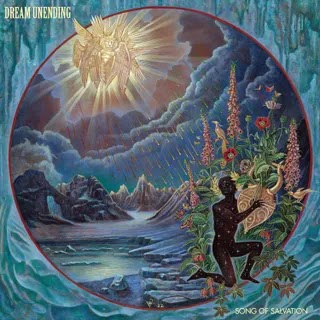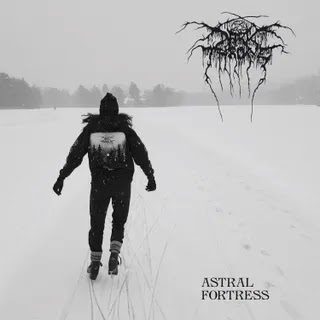The Iowa black metal quartet’s debut explores the mystery of the deep seas with shapeshifting, dynamic songwriting.
The opening guitar riffs of “Counterillumination” slither like a predator stalking prey. Named after the camouflaging ability of animals in the mesopelagic zone—the ocean layer where light becomes increasingly scarce—the track sets a foreboding tone for Iowa quartet Dryad to explore darker territory. Since debuting in 2017, the band has made dynamic black metal that screeches and pummels, but their debut album aims to terrify. The labyrinthine music of The Abyssal Plain is inspired by the animals and geological features in the 36,000 feet of water beneath us, and the band matches the mystery of its subject matter with unwieldy songs that teem with life.
Drummer Oliver Weilein kickstarts “Bottomfeeder” with four hits of the snare. An onslaught of rapturous noise rushes in, led by the searing guitars and dual vocals of Claire “Claw” Nuñez and Grimmtooth: The former’s screams are more traditionally black metal, piercing like shrapnel; the latter delivers deep, brooding growls. The band rounds out the clamor with a chiming ride cymbal, sustained guitar chords, and a quiet synth organ. Midsong, Nuñez lets out a resounding scream that pans across the left and right channels, as if rupturing the space for blast beats to enter, but soon everything fades into serene ambience. With each opportunity to catch your breath, the eventual body blows land harder.
Since their early EPs, Dryad have grown more adept at guiding their songs in unexpected directions. On “Brine Pool Aberration,” lumbering death metal riffs morph into black metal tremolos. Dryad’s seamless tempo and stylistic changes make traditional black metal characteristics feel elastic. “Pompeii Worm” begins with the record’s prettiest passage: a gentle unfolding of detuned guitars and choral synths. The band gradually revs up the tempo, adding tumbling drums and barked vocals, and then a flashy guitar solo as a well-earned moment of grandeur.
While Dryad have always hinted at their lofty ambition, the full-length format gives the band space to experiment. “Raptures of the Deep” is a dungeon synth piece with eerie microtonalities, while the cryptic interlude “Hadal”—named for the deepest ocean zone—glows with the spooky charm of classic John Carpenter soundtracks. “Chimera Monstrosa” is the band’s first lo-fi fantasy instrumental, with glistening keys that flit above a faint drumbeat and diaphanous guitar strums. A chintzy piano paints these waters as both mystical and arcane, an idea cemented with “A Nagging Thought,” where carnivalesque synths and a haunted, pitch-shifted sample close the album in an extended gothic reverie.
The music on The Abyssal Plain speaks to both the allure and fear inherent to the uncharted ocean. These twinned ideas befit a band with two vocalists, and their interplay is at its best when Nuñez and Grimmtooth strike as a team. On “Trenches,” the record’s most overwhelming track, they deliver repeated declarations against helplessness: “Although I’m alone/Inside my mind/The light in my head/It will serve as my guide.” Even if you tune out their words and surrender to the snarling sound, the overdriven guitars and propulsive beat telegraph their fiery determination. In creating these treacherous worlds, Dryad have modeled a way to survive our own.
















0 comments:
Post a Comment